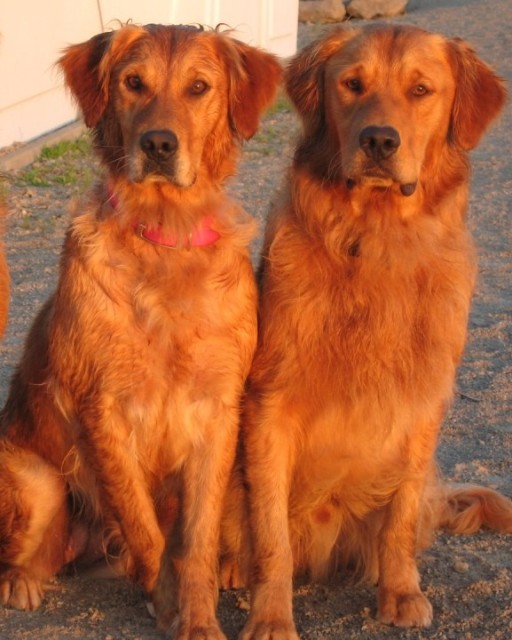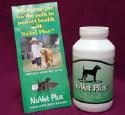QuestionDear Catherine ~
My 10 yo American Stafforeshire Terrier was recently diagnosed with early
stage renal failure. He's 68lbs and neutered. I am not a fan of "commercial"
diets and would like to hear your recommendations. Currently, I feed "green
tripe" with a variety of fresh ground veggies and fruit. I also add Vit B-50, Vit
C, Salmon fish oil, CoQ-10, Milkthistle, ground egg shell (about a tsp. daily),
Vit E, Azodyl and 7oz. of fat daily. After two months on this diet, his BUN
came down from 31 to 19 and his Creatinine from 2.3 to 1.8. I also observed
changes in his attitude during those metabolic changes - He went from
feeling punky and not-so-interested back to his vibrant and "very-excited-
about-food" self. Do you have any other suggestions for Reno's diet or
thoughts on things I might be missing?
One other question ~ I also have a 5yo spayed female Am. Staff that just had
bladder surgery and 4 Struvite stones removed? NOT being a fan of Hills, can
you make any suggestions on a preventative diet for her? She has not had a
history of recurring bladder infections - just this one that didn't respond to
the antibiotics (SMZ-TMP). In the past, I've chosen high-quality grain free
kibble for my dogs but have switched to the raw for my Kidney dog. Cost
makes it a bit prohibitive for all five dogs. I'm open any suggestions you may
have.
Thank you so much for your time ~
LeAnn & the "Brat Pack"
AnswerHi LeAnn,
First of all, congratulations on getting your Staffie's renal issues under control. Home made diet is, IMO, the best way to go with this condition but with the qualifier that it must be formulated corrcetly for both correct nutrient content and to manage the condition. I'm seeing that you restricted phosphorus here, which is appropriate for a dog in early stage renal failure, but there are many serious nutritonal gaps here. I strongly recommend having a diet formulated for him that will continue to support his kidneys at the same time offering neceessary levels of protein, vitamins and minerals. This diet is far too low in protien, Omega6 fatty acids, various vitamins and minerals. It has helped him feel better, but if you continue to feed it the repercussions of nutrient deficiency are bound to have a detrimental effect.
As to the girl with Struvites, I would also suggest a home made diet. Be aware that raw diets tend to have a very extreme no-carb philosophy which means the diets are comprised of something like 97% fat and protein, which can be very hard on the kidney and liver. I prefer a more moderate approach that utilizes the NRC Guidelines nutrtient recommendations and includes a healthy, glutenfree source of fiber. It's my strong opinion that diets for dogs with serious health conditions should be formulated professionally, as I see a wide rainging bunch of problems with haome made diets, but with illness the stakes are much higher.
A few pointers in the struvites dog:
1) as with all uroliths, encourage drinking as much as possible
2) Don't necessarily restrict minerals such as magnesium, but monitor them closely
3) Use cranberry capsules to help prevent reccurrent infection - as long as you are sure there are no othere crystals present, as cranberry is very high in oxalate
4) Don't go overboard acidifying urine (eg high dose Vitamin C) - your dog is a stone former and too much acidity is a set up for the development of oxalates
5)Have frequent re-tests for UTI, since struvite most commonly forms in the presence of a bacterial infection
6) Slightly higher protein may help acidiify the urine without the risk of Vitamin C
Unfortunately, the prescription diets designed to help control stone fomration are notorious for using poor quality ingredients. A home made diet that utilizes better foods must also be formulated to meet the needs of the individual dog's health problem, and since this is very tricky for a layperson, I recommend professional guidance. If this is not an option for you at this time, you might consider joining the PossibleCanine discussion group, where we can help you put the diet together yourself accoridng to NRC guidelines.
All the best, Catherine

 hypo-allergetic dog food
Questionhi,
i have 3 dogs...11 year old lab w/major all
hypo-allergetic dog food
Questionhi,
i have 3 dogs...11 year old lab w/major all
 Diet/Nutrition
QuestionKaiya
QUESTION: I have just become a own
Diet/Nutrition
QuestionKaiya
QUESTION: I have just become a own
 NuVET Pet Wafers will Explode your pitbulls muscle mass....:
QuestionHi Marie my dog had puppies on February the 19t
NuVET Pet Wafers will Explode your pitbulls muscle mass....:
QuestionHi Marie my dog had puppies on February the 19t
 MY DOGS DIET/DIARRHEA
QuestionHi, I have a Jack Russell Terrier 5yrs old and
MY DOGS DIET/DIARRHEA
QuestionHi, I have a Jack Russell Terrier 5yrs old and
 dog food for yorkie ; yorkie vitamins nuvet vitamins; solid gold, innova pup food ;
QuestionI have a cairn terrier/yorkie mix and he does n
dog food for yorkie ; yorkie vitamins nuvet vitamins; solid gold, innova pup food ;
QuestionI have a cairn terrier/yorkie mix and he does n